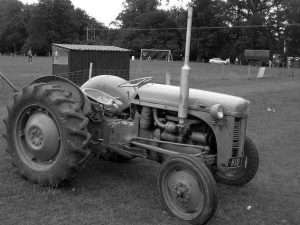Standing in a milking parlour this afternoon, there was a moment to ponder how much such places had changed in forty years. On my grandfather’s farm, each of his twenty cows came into the same place in the stalls each milking time. There was an electric milking machine, so hand milking was not necessary, but the buckets to which the milking clusters were attached were still emptied into churns and the churns were still collected by a lorry from the Milk Marketing Board each morning.
My grandfather could not have imagined the developments that would take place in farming, he would have imagined farming as always something requiring plenty of hands. He would certainly not have imagined the sort of robotic farming featured on the Agriland website on Monday where, for the past six years, 275 cows have been milked by four robots and two workmen. Two centuries ago, the protests of the “Captain Swing” movement in southern and eastern England were directed against the threshing machines which threatened to deprive farm labourers of much of their winter work. Two centuries later, the suggestion that anyone should protest at the progress of technology would be though absurd.
Anyone who might question the inexorable process of the replacement of human labour with machines risks being labelled a “Luddite.” The Luddites took their name from a folkloric Eighteenth Century protester, Ned Ludd who was said to have smashed knitting frames. A Luddite was someone who protested at the weaving jobs of skilled artisans being lost to low-skilled, low-waged labourers operating mechanised looms. The Luddites were protesting against the injustice they felt was being imposed upon them, but they were powerless in the face of government power and the widespread introduction of the new technology. Industrialisation in England was to create an economic chasm between those with access to wealth, resources and technology and those whose physical labour was their only resource.
Technology has changed every occupation, initially supplanting the jobs of manual workers and then those of artisans, it now threatens the professions. Accountants are being replaced by computer packages, solicitors once valued for knowledge of the law are being superseded by the capacity to search electronically vast numbers of documents, even journalists are now threatened.
Simon Kuper, who has has for years been one of my favourite journalists, writes in the Financial Times on “How to cope when robots take your job.” He is pessimistic about the prospects, suggesting that his children might remember him as a “content provider” for an “app.”
No-one seems entirely safe, even medicine is increasingly a matter of technology rather than personal expertise. Ned Ludd might have wondered how things came to be as they are, was there not a moment when someone might have called “stop”?
